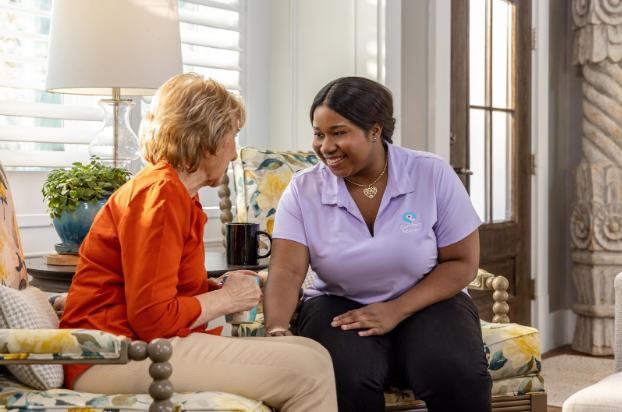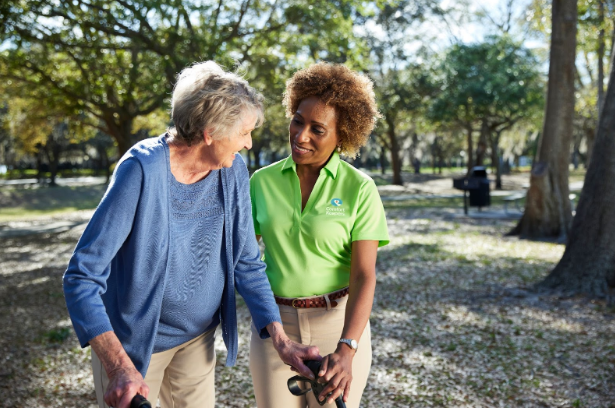Home Care Tips for Improving Senior Memory Function
Alzheimer's and Dementia Care | August 21, 2024

What Every Family and Caregiver Needs to Know About Improving Senior Memory Function
Home Care Tips for Improving Senior Memory | For seniors with memory issues, receiving care while remaining home can enhance their quality of life. This is true for those with minor memory problems that result from age or for those with Alzheimer’s, dementia or other forms of memory loss.
A familiar environment can reduce confusion and improve mental engagement, and being surrounded by beloved objects and memory cues can foster a sense of connection and peace.
#DYK – Almost 40 percent of people over 65 experience memory loss.
For older adults, some conditions progress over time and significantly affect memory. However, lifestyle changes may help control memory problems and help seniors remain independent with extra help from family or a professional caregiver.
Eight Home Care Tips for Improving Senior Memory
Tip #1. Exercise Your Mind:
Engage in activities that challenge your brain, such as memorization, learning to play an instrument, or fixing a car. These tasks help strengthen the brain’s neural connections and promote mental health.
Tip #2. Continue Learning:
Formal education stimulates the brain and keeps it active. Many colleges and universities offer affordable or free courses for seniors, providing an excellent opportunity to maintain mental sharpness.
Tip #3. Stay Connected:
Regular social interaction with friends, family, and community members can reduce the risk of cognitive decline and enhance overall well-being. Those who don’t drive can get assistance from loved ones or a caregiver to help maintain an active social life.
Tip #4. Stay Active:
Physical exercise is crucial for keeping the mind sharp. Seniors interested in increasing their activity levels should consult a physician to ensure their exercise program is safe and effective.
Tip #5. Eat a Balanced Diet:
Proper nutrition supports both the mind and body. Healthcare professionals can provide dietary advice and recommend supplements that improve memory and cognitive function.
Tip #6. Cultivate Self-Confidence:
Believing in your abilities can help protect against mental decline. This may be linked to better stress management and overall resilience.
Tip #7. Keep Your Home Organized:
Maintaining an organized living space, with to-do lists, calendars, and designated spots for frequently misplaced items, can help those with memory issues feel more comfortable and in control.
Tip #8. Prioritize Sleep:
Getting enough sleep is essential for memory retention. Seniors should focus on their sleep habits to avoid memory loss and support overall cognitive health.
Taking an active role in engaging the mind can help older adults continue to live with purpose, connection and joy.
Comfort Keepers® Edmonton is Proud to Offer a Wide Range of Home Senior Care Services
Our trained caregivers will ensure your loved one is comfortable, independent and safe in their home. On top of that, we will also aim to enhance their overall health, quality of life and general happiness.
Top-Notch Home Healthcare for Seniors in Edmonton, Alberta
Comfort Keepers of Edmonton offers a wider range of senior care services. We offer retirement care, respite care, senior care, companionship care, end-of-life care, post-surgery care, palliative care, personal care, and senior living transition services. If you are concerned about the health and well-being of your aging loved ones we can help with 24-hour care and more!
Helping Seniors Age-in-Place with Companionship Care and Interactive Caregiving™
Empathetic care starts in the heart and allows us to meet our client’s needs. Our trained caregivers are selected with one specific quality in mind, empathy. We strive to stimulate our clients emotionally, mentally and socially, thus enhancing their overall quality of life.
Our Interactive Caregiving™ provides a system of care that addresses companionship, safety, nutrition, mind, body, and activities of daily living (ADLs). The system increases seniors’ sense of well-being, independence and companionship by focusing on Senior Mind, Senior Body, Senior Nutrition, and Senior Safety.
Affordable and Client-Directed Homecare is Available for Qualifying Albertans
Comfort Keepers® Edmonton is an Approved Service Provider for the Client Directed Homecare Invoicing (CDHCI) Program Offered by Alberta Health Services.
What is the Client Directed Home Care Invoicing Program (CDHCI)?
CDHCI is a great program provided by Alberta Health Services (AHS), allowing clients to choose an approved agency like, Comfort Keepers Edmonton for Personal Care, Respite Care and Homemaking needs. The chosen agency can then bill AHS directly for services rendered for approved hours through Alberta Blue Cross. Read more about the program HERE.
Accredited Home Care Edmonton
Comfort Keepers® Edmonton was awarded the “Accredited with Exemplary Standing” seal by Accreditation Canada. This honour demonstrates Comfort Keepers’ commitment to offering safe, high-quality home care to its senior clients in Edmonton, AB.
To learn more about senior in-home care in Edmonton, contact the Comfort Keepers® office. Our service territory includes Edmonton, Devon, Sherwood Park, Stony Plain and surrounding areas, contact the Comfort Keepers Edmonton office at 780-465-4665.
References
Normal Aging vs Dementia. Alzheimer Society of Canada. Web 2020.
Psychology Today. Physical Activity Improves Cognitive Function. Web. 2014.
Verywell Mind. Self-Efficacy and Why Believing in Yourself Matters. Web. 2019.
U.S. News & World Report. 5 Secrets to staying sharp as you age. Web. 2015
WebMD. 1 in 9 U.S. Adults Over 45 Reports Memory Issues. Web. 2018.
Mayo Clinic. 7 Tips to Improve Your Memory. Web. 2018.
Individualized Home Care Options
Long-Term Home Care, 24 Hour Home Care & Short Term Care Options Customized for You







